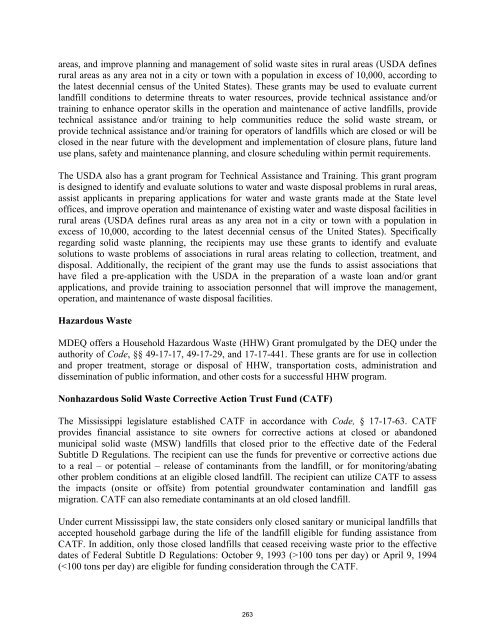in Mississippi
m2078-county-gov-ms
m2078-county-gov-ms
You also want an ePaper? Increase the reach of your titles
YUMPU automatically turns print PDFs into web optimized ePapers that Google loves.
areas, and improve plann<strong>in</strong>g and management of solid waste sites <strong>in</strong> rural areas (USDA def<strong>in</strong>es<br />
rural areas as any area not <strong>in</strong> a city or town with a population <strong>in</strong> excess of 10,000, accord<strong>in</strong>g to<br />
the latest decennial census of the United States). These grants may be used to evaluate current<br />
landfill conditions to determ<strong>in</strong>e threats to water resources, provide technical assistance and/or<br />
tra<strong>in</strong><strong>in</strong>g to enhance operator skills <strong>in</strong> the operation and ma<strong>in</strong>tenance of active landfills, provide<br />
technical assistance and/or tra<strong>in</strong><strong>in</strong>g to help communities reduce the solid waste stream, or<br />
provide technical assistance and/or tra<strong>in</strong><strong>in</strong>g for operators of landfills which are closed or will be<br />
closed <strong>in</strong> the near future with the development and implementation of closure plans, future land<br />
use plans, safety and ma<strong>in</strong>tenance plann<strong>in</strong>g, and closure schedul<strong>in</strong>g with<strong>in</strong> permit requirements.<br />
The USDA also has a grant program for Technical Assistance and Tra<strong>in</strong><strong>in</strong>g. This grant program<br />
is designed to identify and evaluate solutions to water and waste disposal problems <strong>in</strong> rural areas,<br />
assist applicants <strong>in</strong> prepar<strong>in</strong>g applications for water and waste grants made at the State level<br />
offices, and improve operation and ma<strong>in</strong>tenance of exist<strong>in</strong>g water and waste disposal facilities <strong>in</strong><br />
rural areas (USDA def<strong>in</strong>es rural areas as any area not <strong>in</strong> a city or town with a population <strong>in</strong><br />
excess of 10,000, accord<strong>in</strong>g to the latest decennial census of the United States). Specifically<br />
regard<strong>in</strong>g solid waste plann<strong>in</strong>g, the recipients may use these grants to identify and evaluate<br />
solutions to waste problems of associations <strong>in</strong> rural areas relat<strong>in</strong>g to collection, treatment, and<br />
disposal. Additionally, the recipient of the grant may use the funds to assist associations that<br />
have filed a pre-application with the USDA <strong>in</strong> the preparation of a waste loan and/or grant<br />
applications, and provide tra<strong>in</strong><strong>in</strong>g to association personnel that will improve the management,<br />
operation, and ma<strong>in</strong>tenance of waste disposal facilities.<br />
Hazardous Waste<br />
MDEQ offers a Household Hazardous Waste (HHW) Grant promulgated by the DEQ under the<br />
authority of Code, §§ 49-17-17, 49-17-29, and 17-17-441. These grants are for use <strong>in</strong> collection<br />
and proper treatment, storage or disposal of HHW, transportation costs, adm<strong>in</strong>istration and<br />
dissem<strong>in</strong>ation of public <strong>in</strong>formation, and other costs for a successful HHW program.<br />
Nonhazardous Solid Waste Corrective Action Trust Fund (CATF)<br />
The <strong>Mississippi</strong> legislature established CATF <strong>in</strong> accordance with Code, § 17-17-63. CATF<br />
provides f<strong>in</strong>ancial assistance to site owners for corrective actions at closed or abandoned<br />
municipal solid waste (MSW) landfills that closed prior to the effective date of the Federal<br />
Subtitle D Regulations. The recipient can use the funds for preventive or corrective actions due<br />
to a real – or potential – release of contam<strong>in</strong>ants from the landfill, or for monitor<strong>in</strong>g/abat<strong>in</strong>g<br />
other problem conditions at an eligible closed landfill. The recipient can utilize CATF to assess<br />
the impacts (onsite or offsite) from potential groundwater contam<strong>in</strong>ation and landfill gas<br />
migration. CATF can also remediate contam<strong>in</strong>ants at an old closed landfill.<br />
Under current <strong>Mississippi</strong> law, the state considers only closed sanitary or municipal landfills that<br />
accepted household garbage dur<strong>in</strong>g the life of the landfill eligible for fund<strong>in</strong>g assistance from<br />
CATF. In addition, only those closed landfills that ceased receiv<strong>in</strong>g waste prior to the effective<br />
dates of Federal Subtitle D Regulations: October 9, 1993 (>100 tons per day) or April 9, 1994<br />
(


